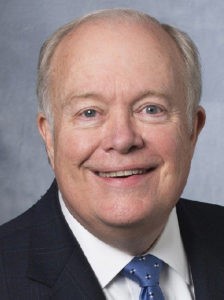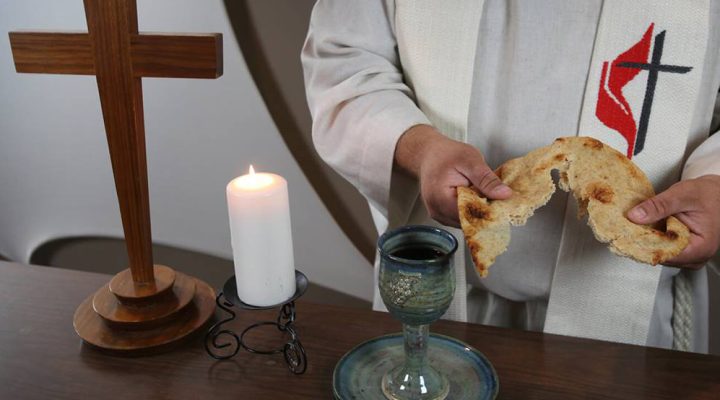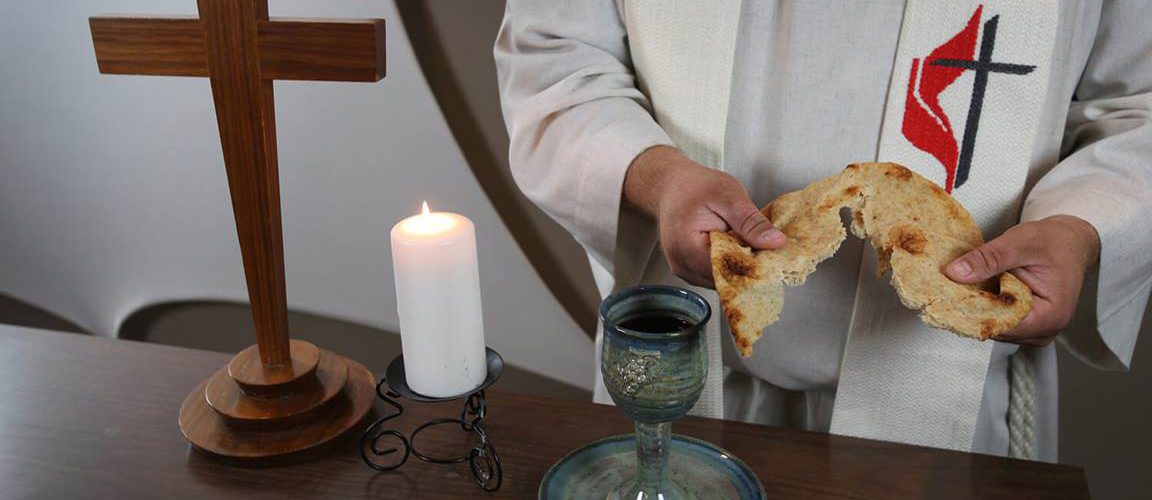The ongoing break-up of The United Methodist Church escalated in mid-July to a public legal feud that appears further to damage the troubled denomination’s reputation.
The latest episode erupted July 14 when 106 local congregations, most located in rural areas and small towns, filed suit against the Florida Annual Conference to invalidate the UMC’s “trust clause,” the legal covenant by which all church property is held “in trust” for the regional governing body. Among other things, the lawsuit alleges that Florida Bishop Ken Carter has failed in his “fiduciary responsibilities” because he hasn’t pursued action against a St. Petersburg pastor who officiated at a same-sex wedding in defiance of United Methodist law.
‘Sinking into the mire’
The Florida lawsuit prompted an article by Cary McMullen, columnist for the Lakeland Ledger, in which the writer criticized the UMC’s dispute as “sinking into the mire.” The Florida Conference has its headquarters in Lakeland, Fla.
“In a sense, the United Methodist Church has only itself to blame for the paralysis that led to the lawsuit,” McMullen wrote. “Of all the Protestant denominations that I’ve seen up close, its system of governance is by far the most tangled and convoluted. Bishops have only local administrative authority, and the unwieldy General Conference meets only once every four years.”
“Of all the Protestant denominations that I’ve seen up close, its system of governance is by far the most tangled and convoluted.”
What McMullen overlooks is that UMC governance vests first in the annual conference, which is the basic unit of church structure. Annual conferences, not bishops or the General Conference, decide how churches exit the denomination based on a section of the Book of Discipline, the collection of church doctrine and policies. This process has fallen under closer scrutiny and criticism.
A restriction that backfired
Paragraph 2553, the section governing disaffiliation, was adopted by a special 2019 General Conference at which a slim majority of delegates tightened the UMC’s bans on same-sex marriage and ordaining LGBTQ clergy. The process originally was proposed by a traditionalist caucus anticipating that progressive congregations would depart the UMC because of the General Conference vote.
Instead, progressive churches and three-fourths of U.S. annual conferences roundly rejected the 2019 General Conference vote on LGBTQ issues, even though the decisions were binding on the denomination. Since then, traditionalist congregations backed by the Wesleyan Covenant Association increasingly have made plans to leave the UMC and join the fledgling Global Methodist Church, founded by the WCA in May. Some congregations, both traditionalist and progressive, have left the denomination and stayed independent.
The pinch has come in the provisions of Paragraph 2553 that traditionalists sought to use against progressives. To keep their real and personal property when they leave, churches must pay two years’ worth of their “fair-share” contributions known as apportionments that fund denomination-wide ministries. Churches also must pay 110% of their “unfunded liabilities” for clergy pensions.
The pinch has come in the provisions of Paragraph 2553 that traditionalists sought to use against progressives.
Both amounts are determined by the annual conference in which the church is located. As Heather Hahn of UM News reported recently, these “exit dues” vary from conference to conference. Regional units also can require additional payments as well as lengthy periods of “discernment” prior to conference votes on departures. “United Methodist annual conferences have a lot of leeway in administering church disaffiliations,” Hahn wrote.
Exit strategies
The Wesleyan Covenant Association now promotes a variety of exit strategies, according to a post on the WCA’s website by its new president, Jay Therrell, a former United Methodist clergyman and an attorney. He contends churches can use one of four approaches:
- Paragraph 2553, provided it’s a “clean” option where the annual conference doesn’t impose additional requirements that Therrell calls “punitive.”
- Paragraph 2548.2, a provision enacted in 1948 that allows congregations “to move to ‘another evangelical denomination’ under a comity agreement,” Therrell wrote. However, this option is now being reviewed for its validity by the UMC’s high court, the Judicial Council, since no “comity agreement” exists between the UMC and the GMC.
- Paragraph 2549, in which a church can close, transfer its assets back to the annual conference, and then negotiate to buy back the property — provided the conference is willing. However, under the trust clause the conference could keep the property outright.
- Pursue litigation, as in the Florida case.
The last option may be riskiest for the Florida churches, according to Lloyd J. Lunceford, editor of “The Guide to Church Property Law,” interviewed by Hahn. She wrote of that interview:
Florida is among the minority of states that use what is called the deference method, Lunceford said. What that means is that courts in “deference” states will adopt the decision made by the highest church body involved in the matter — in this case the property decisions made by the annual conference.
“They in effect defer to the ecclesiastical authorities,” Lunceford said. “And so a lower court in Florida would be bound to defer and rule in favor of the UMC.”
But no matter whether the court relies on neutral principles or the deference method, Lunceford added that churches won’t get very far arguing who is more faithful to church doctrine.
On July 25, a federal judge in Wisconsin dismissed a lawsuit brought by Hebron Community Methodist Church of Fort Atkinson, Wis., seeking to overturn a state statute that essentially supports the United Methodist trust clause. Joe Kelly of Courthouse News Service wrote: “The 1923 amendment to the larger 1849 Wisconsin act incorporating the Methodist Episcopal Church essentially holds that if any local Methodist church or society becomes defunct or dissolved, rights, privileges and title to the church’s property is vested with the church’s conference.”
Battling rumors
Over the summer, churches in several annual conferences have pursued discussions around leaving, with many scheduling congregational votes over the next month. In some cases, such as First UMC in Jonesboro, Ark., ad hoc groups have formed to contest what they say is misleading information about the UMC being disseminated by dissident forces. A unit of United Methodist Communications called Ask the UMC has begun a series of articles titled “Is The United Methodist Church really…?” to refute many of the false rumors.

Bishop Michael McKee
Bishops also have issued responses to the rumors. For example, Bishop Michael McKee of the North Texas Conference sent a letter July 26 to counter such misinformation:
First, I have heard assertions that The United Methodist Church plans to eliminate or alter its foundational theological doctrines, including the doctrine of the Trinity and the resurrection of Jesus Christ. These claims are blatantly untrue and seek only to sow seeds of fear. Not only are our United Methodist doctrines and beliefs protected in The Constitution of the UMC, our Doctrinal Standards and the General Rules, but they are cornerstones of our faith. You can trust that they are unchanging.
Additionally, clergy and laity alike have voiced that they have heard there will not be a place for traditionalists in The United Methodist Church moving forward and that their only option is to depart the denomination. Statements like this undermine the very real and important contributions of the traditionalist leaders and congregations who continue to faithfully serve in the North Texas Conference.
Finally, I have heard that some within the North Texas Conference believe that violations or disregard for The Book of Discipline are rampant and that accountability is lax. In truth, while I typically receive a handful of complaints each year about clergy or churches violating The Book of Discipline, the clergy and churches of the North Texas Conference continue to demonstrate a strong commitment to our polity, and the bonds of our connection remain strong.
As with the culture of misinformation that has infected American politics, rumors about the United Methodist Church and its future can only be countered by those willing to take the time to investigate and verify facts. Disputes over reasons to leave the church and how to leave will provide fertile ground for untruths that will continue to damage The United Methodist Church’s public reputation.
Cynthia B. Astle is a veteran journalist who has covered the worldwide United Methodist Church at all levels for more than 30 years. She serves as editor of United Methodist Insight, an online journal she founded in 2011.
Related articles:
Just when you think the United Methodist Church breakup can’t get any more difficult …
United Methodist Church split draws celebration, lament and soul-searching


